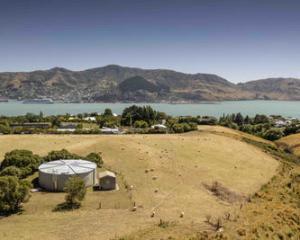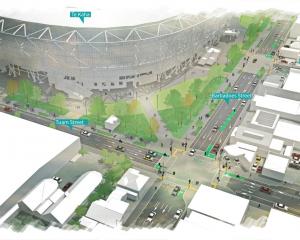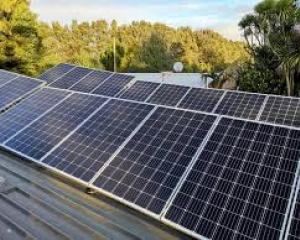
The company, Rockwell, says it is moving as fast as possible to get to the bottom of what's gone wrong at 230 High St but in the meantime public safety must come first.
The engineering company Beca has - in a report for the government - confirmed the eight-storey, $8 million-plus block has 10 major seismic design flaws that would probably render it "unstable" in an earthquake that, if it were designed right, the building would withstand.
Rockwell's managing director Soung Joon Kim said he understood from experts that the building posed more risks in a quake at the rear, away from the mall at the front.
But a cordon was necessary at the front due to the risk of the glass facade shattering in a quake, "the worst-case scenario", he said.
"From a safety standpoint, all I can do as a company, and as part of our social responsibility, I would like to get out there and and block off this area, just in case," Kim said.
"It's better to be safe than sorry."
The council said it had asked to see the engineering analysis that supported setting up a cordon.
The Beca report said the building would likely be unstable at what is known as design level earthquake loading, due to insufficient column base plates and bolts and weaknesses in how quake forces were transferred to the piles.
"As a result, there is inadequate strength of some members and of the overall structure at ultimate limit state design loads, leading to possible rupture or instability."
Rockwell did not take any shortcuts with the project and was not responsible for the building's defects, Kim said.
"I don't see how the developers are at fault here because it's relied on the construction system ... that's worked for the past 20 years or more.
"We played by the book on everything."
The Beca report had recommended further investigation into whether the building might twist and damage neighbouring buildings in a quake.
He has engaged independent engineers to do that, and to come up with ways to strengthen it - demolition was an option that was a long way off, he said.
Rockwell had put a hold on all development projects till it resolved the problems at 230 High St, but the stigma attached to the project would probably stick with it, Kim said.
The council has denied any accountability, saying it relied on independent chartered professional engineers who designed and peer-reviewed 230 High St.
Kim said developers relied on those engineers too, but also on the council to provide the reassurance that building plans were checked and up to standard.
"When they issue the final approval there's no reason for us to challenge it."
Another Christchurch developer, Antony Gough, had called into question Rockwell's knowledge of local conditions.
But Kim rejected that, saying they employed a leading project manager, Kensway, used design engineer Joo Cho, who had a good track record, and used engineers to peer review the designs as far back as the concept stage.
"It won't be accurate to say we're short-cutting. In fact, we've probably overspent and we've taken extra measures, we've gone the extra mile, and all the compliance and regulatory requirements have been met."
It was too early to talk about legal action, he said.
"Where things went awry, I don't know. If there's relativity in the way engineering data is interpreted, then can you really fault the people involved? - I don't know. Or is this an absolute thing?"
It is highly unusual for a building that has consent to then be denied a code compliance certificate - as has happened in the case of 230 High St - that places it out of bounds to the public.
The block was now sitting empty and was a drain on funds, Kim said.
"I think the right question is, was there something wrong with the system? ... If there is any admittance of guilt or any path forward, it has to be a collective one.
"And I'd rather spend my resources trying to look for answers collectively together, as soon as possible, because that's what we need now for the sake of public safety."
Kim lived in Salt Lake City, US, where he said he developed mining projects before coming to New Zealand in 2015 to run Rockwell for the company's owner, Jinho Kwon.
Rockwell recently completed a four-storey apartment block in Worcester St.













